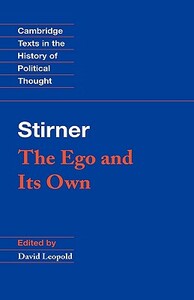Take a photo of a barcode or cover
challenging
dark
slow-paced
challenging
hopeful
informative
inspiring
mysterious
reflective
medium-paced
challenging
tense
slow-paced
“Nothing is more to me than myself!”
Well, I can’t say much about this or I can just as well fill a whole book. Let’s be honest: this is absolutely not an easy read: verbose, cumbersome, bombastic, incantatory and above all an incessant bombardment of propositions, edging unreadability. I understand the comparison with Nietzsche, that other iconoclast. Certainly when it comes to the idiosyncratic character of Stirner’s thinking: you have to constantly switch your mindset, because he has the habit of filling in words and concepts very differently than we would do now, and probably also in his time. Take for instance the ‘egoism’ that he so extols, with which he means something quite different than our negative connation. Or the ‘spiritual’ by which he also means rationalism, and so on. So you have to keep your mind on it. But if you succeed, then this turns out to be an exceptionally rich book, which constantly challenges obvious and generally accepted assumptions (there’s Nietzsche again). Provocative, and sometimes also annoying. In fact, he could be called one of the first critics of modernity (I will ignore Joseph De Maistre here, who belongs to a completely different trend); I found his criticism of Protestantism particularly lucid (I suspect that Charles Taylor got his inspiration from this). But what should we ultimately think of the era of the ego that he defended? I can see what he means, and also that it has been largely realized in our Western liberal society: the free-spirited individual who can achieve his maximum fulfillment through complete self-determination. Beautiful, on paper, only: at what cost? Just think of excessive individualism, amoral consumerism, or extreme inequality? Stirner's iconoclasm certainly has its merits, but he clearly remained blind to the downsides of his acclaimed egoism.
PS. I don't know if it was ever pointed out, but this book was published shortly before the first (not yet so extensive edition) of Leaves of Grass by Walt Whitman. Coincidence?
He basado mi causa en nada.
El Único y su Propiedad es una obra escandalosa, vituperada hasta la fecha, donde Max Stirner concentra sus armas no solo contra lo sagrado sino contra aquellos que pretenden abolir prisiones revistiendo a los carceleros. La modernidad se cree liberada de Dios transportando lo sagrado al Estado, la humanidad, la sociedad, la moralidad o la verdad. De tal forma, el autor nunca pierde la oportunidad de burlarse de los modernos: los liberales, los socialistas y los humanistas.
Este libro apunta a más que al egoísmo por el que causó tal fugaz revuelo tras su publicación. La crítica de Stirner es una protesta contra el trascendentalismo, contra el querer disecar el mundo en apariencias y esencias, en espíritus y cuerpos. Las ideas platónicas, el absoluto hegeliano, la humanidad de Feuerbach, no son más que momias de lo único real que es el devenir. En oposición a estas, Stirner propone el único, aquello que es plenamente terrenal, transitorio e individual. El único se aniquila y se recrea a sí mismo constantemente, por lo que «los conceptos no lo expresan».
En mi opinión, su crítica, por más corrosiva que sea, no puede ni debe distanciarse de la filosofía*. Stirner se sostiene de la razón práctica, la inmanencia y el perspectivismo, y con ello urge una filosofía que trate correctamente la relación del individuo y el mundo, sin invocar aquellos seres supramundanos que el bávaro apoda ideas o ilusiones. Diría que toda la segunda parte de la obra es el emprendimiento filosófico de Stirner.
Leer con cautela, y tomando en cuenta que el autor se está riendo en tu cara, tal como él mismo asevera.
*La filosofía para Stirner es la “teología” de las ilusiones, ejemplificada en el racionalismo desenfrenado del hegelianismo. Tal noción no consideraría filósofos a los escépticos como Bacon y Hume. Así mismo, los materialistas serían unos nuevos beatos que en última instancia resultan indistinguibles de los filósofos. Ese afán de querer separar el escepticismo, el devenir y la inmanencia de la filosofía me resulta insulso, por lo que rechazo la posición del autor.
slow-paced
Overall, good read. Interesting concepts and analysis of individuality
funny
informative
reflective
medium-paced
Moderate: Antisemitism
period-typical antisemitism in a few lines, nothing special
In terms of interesting subject matter I would give five stars. Stirner’s theoretical framework (there is no inherently higher powers or objective morality and we are all motivated by our egos even if we claim otherwise) is interesting and well-argues. However I still disagree with his general conclusions and that is what downgrades this book. Furthermore it is hard to see what he supports given all he criticizes. It is hard to see his view of how we should act in accordance with our egos would actually be able to work in a reasonable manner.
informative
reflective
medium-paced





